Related Research Articles

Christian René Marie Joseph, Viscount de Duve was a Nobel Prize-winning Belgian cytologist and biochemist. He made serendipitous discoveries of two cell organelles, peroxisome and lysosome, for which he shared the Nobel Prize in Physiology or Medicine in 1974 with Albert Claude and George E. Palade. In addition to peroxisome and lysosome, he invented scientific names such as autophagy, endocytosis, and exocytosis in a single occasion.
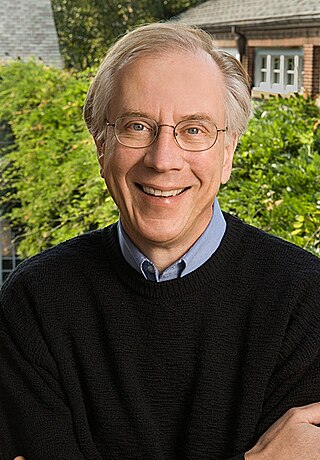
Thomas Robert Cech is an American chemist who shared the 1989 Nobel Prize in Chemistry with Sidney Altman, for their discovery of the catalytic properties of RNA. Cech discovered that RNA could itself cut strands of RNA, suggesting that life might have started as RNA. He also studied telomeres, and his lab discovered an enzyme, TERT, which is part of the process of restoring telomeres after they are shortened during cell division. As president of Howard Hughes Medical Institute, he promoted science education, and he teaches an undergraduate chemistry course at the University of Colorado.
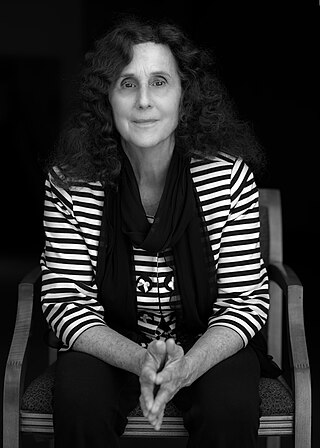
Pamela Jane Bjorkman NAS, AAAS is an American biochemist. She is the David Baltimore Professor of Biology and Biological Engineering at the California Institute of Technology (Caltech), Her research centers on the study of the three-dimensional structures of proteins related to Class I MHC, or Major Histocompatibility Complex, proteins of the immune system and proteins involved in the immune responses to viruses. Bjorkman is most well known as a pioneer in the field of structural biology.

Susan Randi Wessler, ForMemRS, is an American plant molecular biologist and geneticist. She is Distinguished Professor of Genetics at the University of California, Riverside (UCR).

Carolyn Ruth Bertozzi is an American chemist and Nobel laureate, known for her wide-ranging work spanning both chemistry and biology. She coined the term "bioorthogonal chemistry" for chemical reactions compatible with living systems. Her recent efforts include synthesis of chemical tools to study cell surface sugars called glycans and how they affect diseases such as cancer, inflammation, and viral infections like COVID-19. At Stanford University, she holds the Anne T. and Robert M. Bass Professorship in the School of Humanities and Sciences. Bertozzi is also an Investigator at the Howard Hughes Medical Institute (HHMI) and is the former Director of the Molecular Foundry, a nanoscience research center at Lawrence Berkeley National Laboratory.

The College of Biological Sciences (CBS) is one of seven freshman-admitting colleges at the University of Minnesota. Established in 1869 as the College of Science, the College of Biological Science is now located across both the Minneapolis and the St. Paul campuses. The current interim dean is David Greenstein.
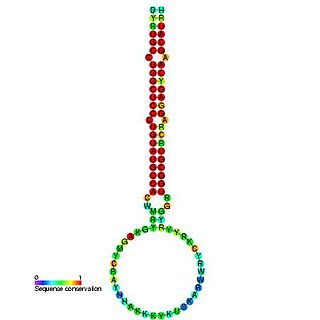
In molecular biology, mir-160 is a microRNA that has been predicted or experimentally confirmed in a range of plant species including Arabidopsis thaliana and Oryza sativa (rice). miR-160 is predicted to bind complementary sites in the untranslated regions of auxin response factor genes to regulate their expression. The hairpin precursors are predicted based on base pairing and cross-species conservation; their extents are not known. In this case, the mature sequence is excised from the 5' arm of the hairpin.
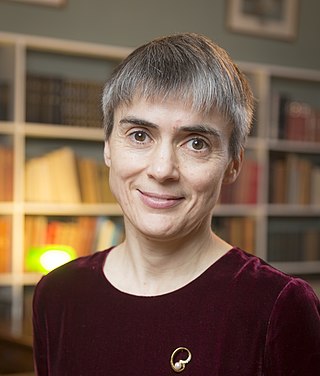
Dame Henrietta Miriam Ottoline Leyser is a British plant biologist and Regius Professor of Botany at the University of Cambridge, Chief Executive Officer of UK Research and Innovation (UKRI) and the Sainsbury Laboratory, Cambridge.
Brigid L. M. Hogan FRS is a developmental biologist noted for her contributions to mammalian development, stem cell research and transgenic technology and techniques. She is currently a Professor in the Department of Cell Biology at Duke University, Born in the UK, she became an American citizen in 2000.

BioCity Nottingham is a bioscience science park in central Nottingham in the United Kingdom. It is the UK's largest bioscience innovation and incubation centre.

Jennifer Anne Doudna is an American biochemist who has done pioneering work in CRISPR gene editing, and made other fundamental contributions in biochemistry and genetics. Doudna was one of the first women to share a Nobel in the sciences. She received the 2020 Nobel Prize in Chemistry, with Emmanuelle Charpentier, "for the development of a method for genome editing." She is the Li Ka Shing Chancellor's Chair Professor in the Department of Chemistry and the Department of Molecular and Cell Biology at the University of California, Berkeley. She has been an investigator with the Howard Hughes Medical Institute since 1997.
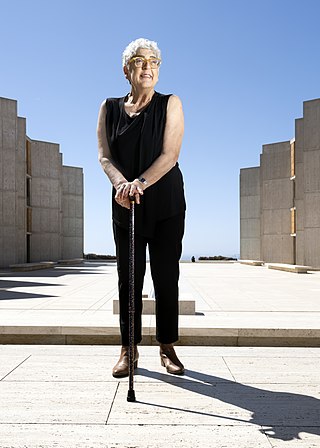
Joanne Chory is an American plant biologist and geneticist. Chory is a professor and director of the Plant Molecular and Cellular Biology Laboratory, at the Salk Institute for Biological Studies and an investigator of the Howard Hughes Medical Institute.
Tracy L. Johnson is the Keith and Cecilia Terasaki Presidential Endowed Chair in the Life Sciences and Professor of Molecular, Cell, and Developmental Biology at the University of California, Los Angeles (UCLA). She is also a professor of the Howard Hughes Medical Institute. In May 2020, she was named Dean of the UCLA Division of Life Sciences.
Ruth Lehmann is a developmental and cell biologist. She is the Director of the Whitehead Institute for Biomedical Research, succeeding David Page. She previously was affiliated with the New York University School of Medicine, where she was the Director of the Skirball Institute of Biomolecular Medicine, the Laura and Isaac Perlmutter Professor of Cell Biology, and the Chair of the Department of Cell Biology. Her research focuses on germ cells and embryogenesis.
Vinod Bhakuni (1962–2011) was an Indian molecular biophysicist and the head of the Molecular and Structural Biology Division of the Central Drug Research Institute (CDRI). He was the founder of the Protein Chemistry laboratory of CDRI and was known for his contributions to the study of protein folding. A recipient of the National Bioscience Award for Career Development, he was an elected fellow of the Indian Academy of Sciences, Indian National Science Academy and the National Academy of Sciences, India. The Council of Scientific and Industrial Research, the apex agency of the Government of India for scientific research, awarded him the Shanti Swarup Bhatnagar Prize for Science and Technology, one of the highest Indian science awards, in 2006, for his contributions to biological sciences.
Alok Krishna Sinha is an Indian molecular biologist, biochemist, plant physiologist and a staff scientist Grade VII at the National Institute of Plant Genome Research (NIPGR). Known for his research on Mitogen-activated protein kinase (MAPK) cascade in plants, he is a three-time Alexander von Humboldt Fellow and an elected fellow of the National Academy of Sciences, India. The Department of Biotechnology of the Government of India awarded him the National Bioscience Award for Career Development, one of the highest Indian science awards, for his contributions to biosciences, in 2013.
Manoj Majee is an Indian plant molecular biologist, biochemist, inventor and a senior scientist at the National Institute of Plant Genome Research (NIPGR), New Delhi. He is known for his studies on the molecular and biochemical basis of seed vigor, longevity and seedling establishment.
Keiko Torii is a Japanese plant scientist and academic teaching at the University of Texas at Austin as of September 2019.
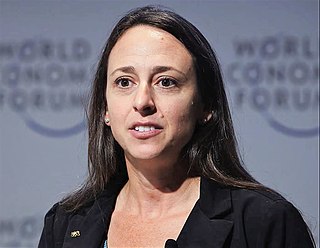
Amy Elizabeth Herr is the John D. and Catherine T. MacArthur Professor at the University of California, Berkeley, where she is attached to the Department of Bioengineering. At Berkeley she was also the founding executive director of the Bakar Bioenginuity Hub. Herr is a Chan Zuckerberg BioHub Investigator and the Chief Technology Officer of the Chan Zuckerberg Biohub Network, a fellow of both the National Academy of Inventors and the American Institute of Medical and Biological Engineering, as well as a co-founder of Zephyrus Biosciences, a biotechnology company that was acquired by Bio-Techne.
Jennifer L. West is an American bioengineer. She is the current Dean of Engineering and Applied Science at the University of Virginia. She was the Fitzpatrick University Professor of Biomedical Engineering at Duke University from 2012-2021. In 2000, West cofounded Nanospectra Biosciences in Houston to develop a cancer therapy based on gold nanoparticles that destroy tumor cells and has been listed by MIT Technology Review as one of the 100 most innovative young scientists and engineers world wide.
References
- 1 2 "Bonnie Bartel : Rice University Department of BioSciences". biosciences.rice.edu. Archived from the original on April 27, 2016. Retrieved May 3, 2016.
- ↑ "Academy Home - American Academy of Arts & Sciences" (PDF). www.amacad.org. Archived from the original on March 4, 2016. Retrieved May 3, 2016.
- ↑ 2016 NAS Awards Announcement Archived May 6, 2016, at the Wayback Machine
- ↑ "Bonnie Bartel : Rice University Department of BioSciences". biosciences.rice.edu. Archived from the original on April 27, 2016. Retrieved May 4, 2016.
- ↑ "Bonnie Bartel - Google Scholar Citations". scholar.google.com.
- ↑ "/ BIOC115 class web page". Archived from the original on July 29, 2016. Retrieved May 3, 2016.
- ↑ "Bonnie Bartel, PhD Research Abstract | HHMI.org". HHMI.org. Retrieved May 4, 2016.
- ↑ "Biochemistry". news.rice.edu.
- ↑ "Bartel wins 2011 Presidential Mentoring Award". news.rice.edu.
- ↑ National Academy of Sciences Members and Foreign Associates Elected, News from the National Academy of Sciences, National Academy of Sciences, May 3, 2016, archived from the original on May 6, 2016, retrieved May 14, 2016